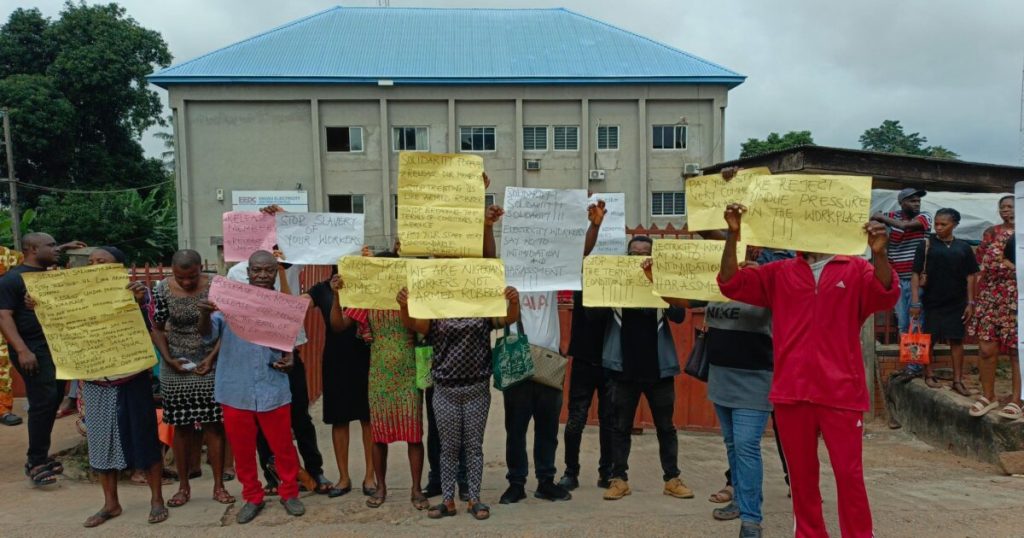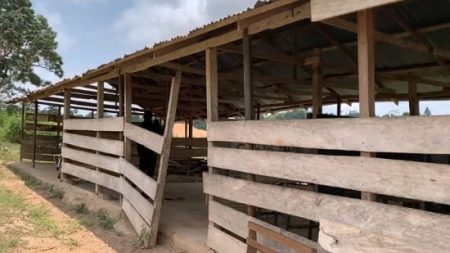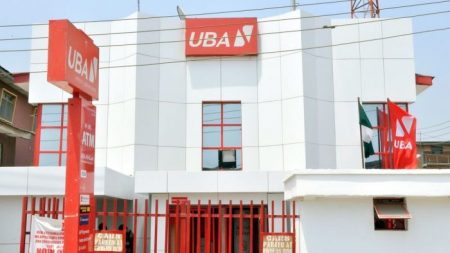The Nigerian Union of Electricity Employees (NUEE) staged a significant protest across Anambra State, including Awka and Onitsha, to decry the alleged unlawful detention of five of their colleagues by the Enugu Electricity Distribution Company (EEDC). The demonstrations, held at various EEDC district offices, involved workers barricading entrances and effectively shutting down all operations. The detained staff, including a mother of three, were reportedly arrested on July 31st by operatives of the Special Anti-Robbery Squad (SARS) in Awkuzu, acting on alleged instructions from EEDC management regarding purported professional misconduct. This incident ignited widespread outrage amongst the union members, who utilized the protest to also voice their longstanding grievances against the EEDC, which supplies electricity to five southeastern states: Anambra, Imo, Enugu, Abia, and Ebonyi.
Beyond the immediate concern of their detained colleagues, the protesting NUEE members highlighted a range of deeply-rooted issues with their working conditions under EEDC management. They decried what they described as poor remuneration, persistent harassment, inadequate medical care, and a pervasive atmosphere of intimidation. They alleged that these oppressive conditions have led to the death of some workers and left others incapacitated. The protestors accused EEDC of fostering an “oppressive working environment” across the entire southeastern region it serves, impacting electricity workers throughout the five states. The protests took a highly visible form, with workers marching from service and customer offices in Onitsha and Awka through adjacent streets, disrupting operations and preventing access to EEDC premises. They carried placards bearing messages demanding the release of their detained colleagues, fair wages, an end to what they termed “slavery,” and an end to intimidation and harassment. The placards also called for respect for the terms and conditions of their service.
The protest leaders articulated their grievances, emphasizing both the immediate crisis of the detentions and the broader issues plaguing the workforce. Ndukwu Bonaventure, Chairman of NUEE, explained the arduous process the union undertook to locate their missing colleagues. They were ultimately found after five days of searching various police formations, detained at the SARS facility in Awkuzu. Bonaventure stressed the unacceptable nature of working under constant threat of arbitrary arrest, emphasizing the union’s commitment to pursuing justice through peaceful and legal channels. He acknowledged that misconduct should not go unaddressed but insisted that disciplinary procedures must adhere to due process. He firmly stated that their members were not criminals and should not be treated as such, emphasizing the existence of established internal procedures that should be respected.
Friday Idoko, Vice Chairman of NUEE in Anambra State, further underscored the precarious working conditions and lack of care from EEDC management. He shared his personal experience of a near-fatal electrocution two weeks prior, revealing that he was hospitalized for a week without any contact from management. He also highlighted the tragic case of a worker who died on the job, whose family received no support from the company. Idoko’s testimony underscored the workers’ sense of vulnerability and the lack of concern from the management for their well-being. The union’s demand was clear and urgent: the immediate release of their five detained colleagues. Idoko’s statement conveyed the workers’ desperation and resolve, implying a potential for further escalation if their demands were not met.
The NUEE’s protest reflects deeper concerns regarding labor relations and worker rights within the Nigerian power sector. The allegations of arbitrary arrests, poor working conditions, and lack of due process raise serious questions about the EEDC’s treatment of its employees. The incident involving SARS, a police unit notorious for its human rights abuses, further complicates the situation and highlights the potential for abuse of power within the context of labor disputes. The fact that a mother of three was among the detained individuals adds a layer of human tragedy to the situation. The workers’ claims of inadequate remuneration, harassment, and lack of medical care point to systemic issues that require urgent attention.
Furthermore, the incident underscores the challenges faced by organized labor in Nigeria, particularly in sectors like the power industry that are often dominated by powerful corporate entities. The NUEE’s efforts to secure the release of their colleagues and address their grievances demonstrate the importance of unionization in protecting worker rights and advocating for improved working conditions. The allegations against the EEDC raise questions about corporate accountability and the need for greater oversight of power distribution companies to ensure fair treatment of employees. The incident also highlights the need for stronger legal frameworks and enforcement mechanisms to protect workers’ rights and prevent abuses. The lack of response from the EEDC’s Head of Corporate Communications further underscores the need for greater transparency and accountability within the company.














